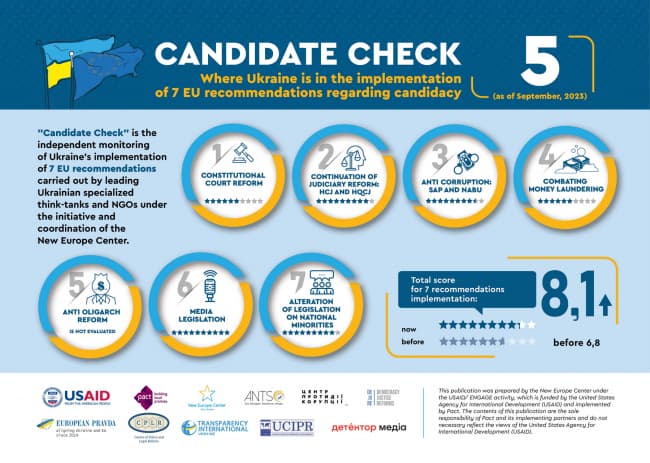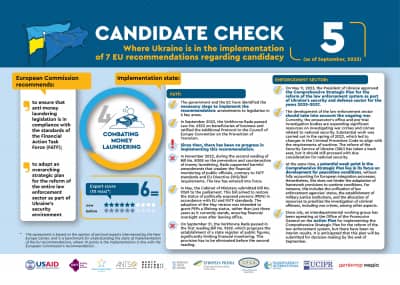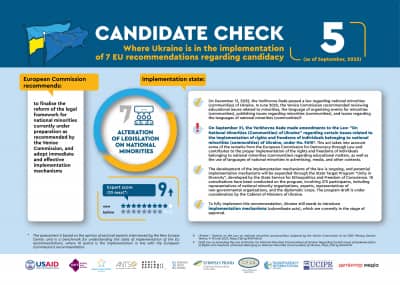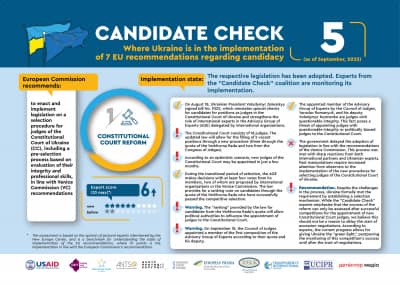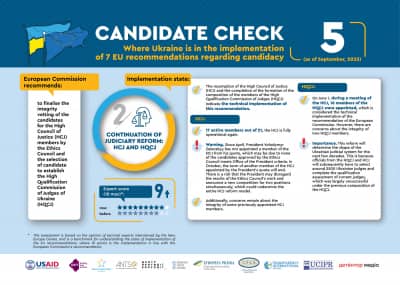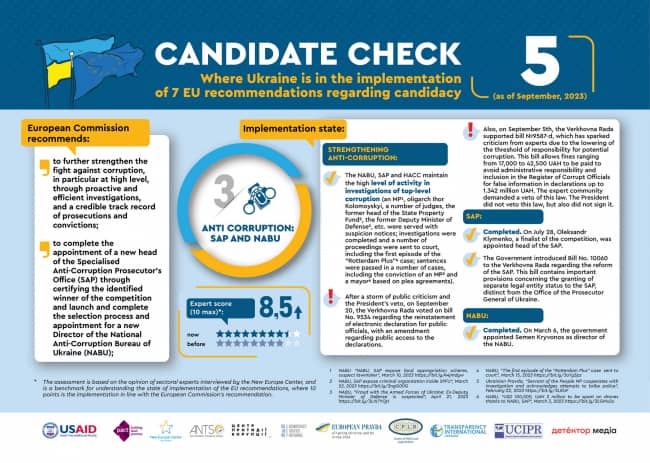Mission Not Accomplished: Start of EU Accession Negotiations Still at Risk
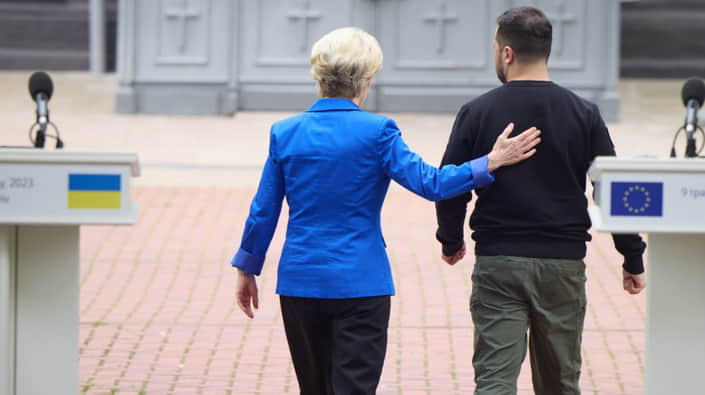
The European Commission (EC) is set to present its annual enlargement report in late October, which could be a historic moment for Ukraine. In the report, the EC is expected to recommend starting official accession negotiations with the EU.
Media leaks from Brussels confirm that the EC is optimistic. However, the reality is more complicated.
The final "green light" for the start of accession negotiations will be given not by the European Commission but by the member states, who must agree unanimously. The obstacle may not be Hungary, but the European capitals that monitor reforms [by candidate countries – ed.]. Because the Ukrainian parliament persistently fails to implement one of the EU's recommendations, which several countries consider crucial.
Independent monitoring, to which European diplomats also pay attention, confirms that Ukraine has not fulfilled all seven conditions. The official presentation of this research will take place on 28 September at the EU Accession Forum. Ahead of the presentation, European Pravda is publishing and explaining the main results in the Candidate Check monitoring report.
Eight out of ten on EU Conditions
Everyone in Ukraine must have heard by now that Kyiv needs to meet seven conditions before EU accession negotiations can start. The Ukrainian government received this list when it was given candidate status.
Initially, the EU insisted that meeting these conditions was necessary to confirm candidate status. However, later, under pressure from Kyiv and Ukraine's friends, European countries changed their approach. Now everyone agrees that meeting the conditions is sufficient to start EU membership negotiations.
Therefore, obtaining a "green light" is of crucial importance for Kyiv.
In June 2022, the issue arose of an independent assessment of Ukraine’s fulfillment of the seven conditions. To monitor Ukraine’s progress, a consortium was created made up of think tanks and experts responsible for various aspects of European integration, which includes European Pravda The current round of assessments is the fifth in a series and could be the last.
Overall, their assessment of Ukraine is positive.
The average score for meeting the conditions is slightly higher than 8 out of 10 (it was 6.8 out of 10 in the previous round).
An interesting detail: there was a noticeable leap in meeting the conditions in the last two to three weeks. At the beginning of September, the expert consortium was preparing to sound the alarm and talk about stagnation. Ukraine had serious problems, and even some setbacks in reform compared to the previous assessment, in May.
But during the month of September, the government, parliament, and the president managed to reverse this trend.
Problem number one: parliament and the "PEP Law"
Let's start with the biggest challenge, "Combatting Money Laundering," which is No. 4 on the EU's list. Ukraine was given 6 out of 10 points. There were even discussions about possibly lowering the score further.
However, politically, from the perspective of the EU member states, only one component matters: legislation regarding politically exposed persons (PEPs). In November 2022, lawmakers passed a law that weakened financial monitoring rules for public officials (meaning for themselves and their family members), contrary to standards set by the Financial Action Task Force (FATF) and the requirements under the EU [Anti-money laundering] Directive.
The government's legislative proposal, which would rectify this issue, has failed to be included on the agenda for several sessions of parliament due to insufficient votes.
Even public statements by the EU have not had any effect. An interview with the EU Ambassador to Ukraine, Matti Maasikas, in which he referred to the restoration of PEP rules as one of the two significant conditions for the EU, did not help gather support for the project.
Essentially, the Ukrainian parliament’s opposition to PEP legislation risks putting the situation in a deadlock and jeopardises the start of Ukraine's EU accession negotiations. By contrast, if this issue is resolved, that would essentially mean the removal of the main obstacle to the negotiations.
Minority problems? Ukraine did (almost) everything
Hungary has earned a reputation as a country ready to throw a spanner in the works of Ukraine's path to the EU and NATO, and not without reason. Last year, they succeeded in having one of the seven EU conditions be on minorities.
The crisis was deepened when the Venice Commission [an advisory body to the Council of Europe on constitutional law – ed.] adopted an inadequate conclusion, reached without proper consultations with Ukraine.
It's making some recommendations that smacked of pro-Russian views (read more Venice Smells Like Russia: How Council of Europe Body Finds a Way to Undermine Ukraine's EU Future).
After Ukaine responded with a definitive "no" to those recommendations, Budapest entered into dialogue, albeit not in public. Ukraine has resumed consultations with its Hungarian community.
It seems very likely that Hungary will not block the decision to start Ukraine's EU accession negotiations. Recently, the Ukrainian parliament amended the law on national minorities, taking into account the "reasonable" part of the Venice Commission's recommendations.
The government has prepared a programme in that regard. The assessment is 9 out of 10.
Justice? Conditions met, although not perfectly
Two out of seven conditions (Nos 1 and 2) are dedicated to the rules governing the Constitutional Court and the reform of the general judicial system. This has given rise to a unique situation.
The reform was delayed for the first criterion. Experts believe this was due to the government's desire to "control" and adopt an unacceptable selection system that would enshrine political influence on the Constitutional Court. Eventually, a law that may prove effective was passed and received a positive assessment from the EU. However, to date no competition for the appointment of new judges under the new law has taken place. That will take time. Therefore, progress on this condition received 6 out of 10 points.
"We believe that this (failure to hold a competition) should not be a reason for delaying the start of membership negotiations.
According to experts, the current progress allows for Ukraine to receive the 'green light,'
postponing the monitoring of success with this competition until after the start of negotiations," according to the ‘Candidate Check’ monitoring group.
The situation is significantly better with ongoing judicial reform and the formation of the High Council of Justice and of the High Qualification Commission of Judges of Ukraine: in these areas, the state's efforts received 9 out of 10.
Anti-corruption: Problem or Myths
In international discourse, there are often accusations against Ukraine regarding its efforts in combating corruption. However, under this comprehensive condition (No. 3 on the EU list), which includes many components, Kyiv has achieved a fairly good result.
A score of 8.5 out of 10 is indeed quite high. Ukraine could have scored poorly in this area if lawmakers had not canceled their embarrassing decision to postpone the restoration of electronic asset declarations. This issue was successfully resolved.
There are still some tasks remaining in the field of anti-corruption, as shown in the infographic.
Media Reform: A Success Story
Even in the previous stages of evaluation, Ukraine received the highest score for the condition of adapting to the European Audiovisual Directive (No. 6 on the EU list). In the summer, formal compliance with this criterion was completed after the adoption of an updated advertising law, earning Ukraine a perfect 10 in the rating.
The EU's "Anti-Oligarch" Mistake
Finally, there is the anti-oligarch law. European Pravda reported that in the previous Candidate Check rating, experts had made an unprecedented, unanimous decision. Evaluation of condition no. 5 on the EU list, regarding the implementation of anti-oligarch reform, has been discontinued.
In June 2023, the Venice Commission adopted a recommendation that, due to its scope, was simply impossible to implement in just a few months. Moreover, the influence of oligarchs in Ukraine has significantly decreased over the past two years, due to the Russian invasion. The Ukrainian monitoring group insisted that this condition cannot be assessed, and it should not be a barrier to opening negotiations with the EU. According to our information, the European Commission takes a similar position.
* * * * *
Ukraine has made good progress in meeting the seven EU conditions. The only obstacle to reaching the level that would allow the opening of membership negotiations is the adoption of legislation on politically exposed persons (PEPs) that complies with the FATF standards and EU directives.
Therefore, the Ukrainian parliament must gather the courage to pass this law without delaying Ukraine's progress towards EU membership.
Written by Sergiy Sydorenko
European Pravda, editor
